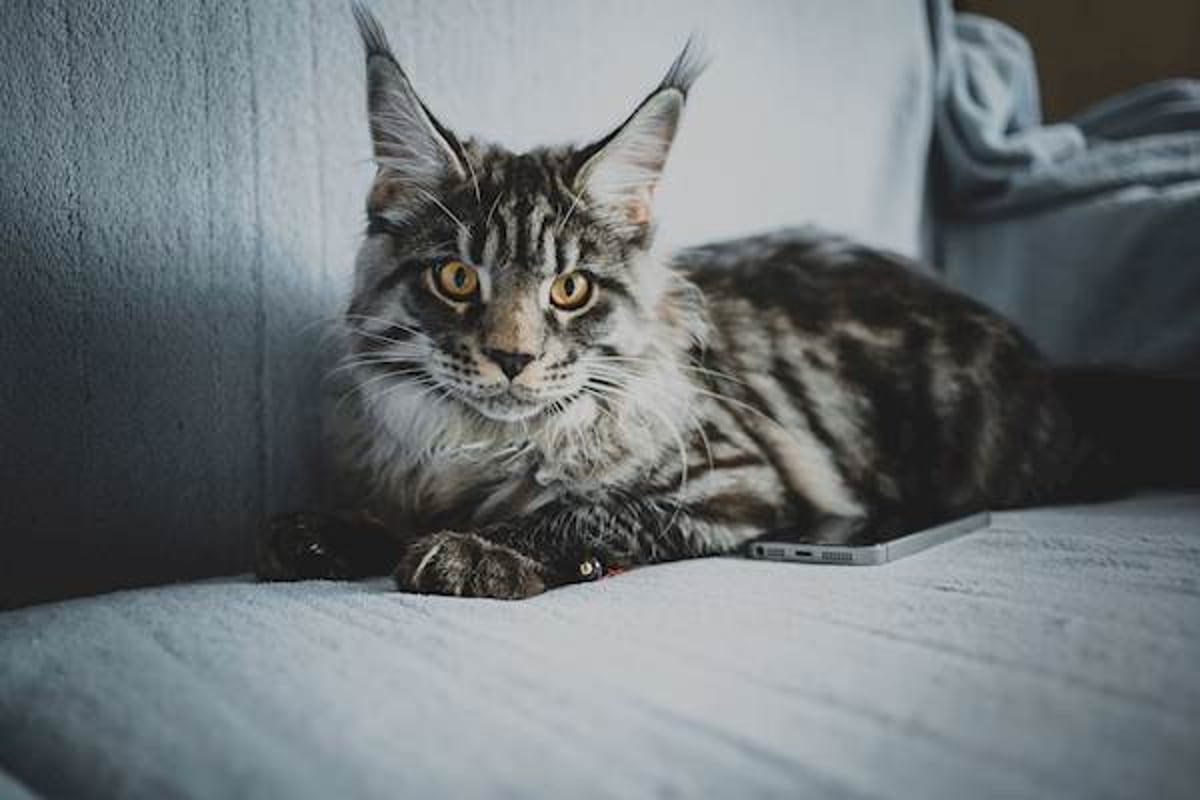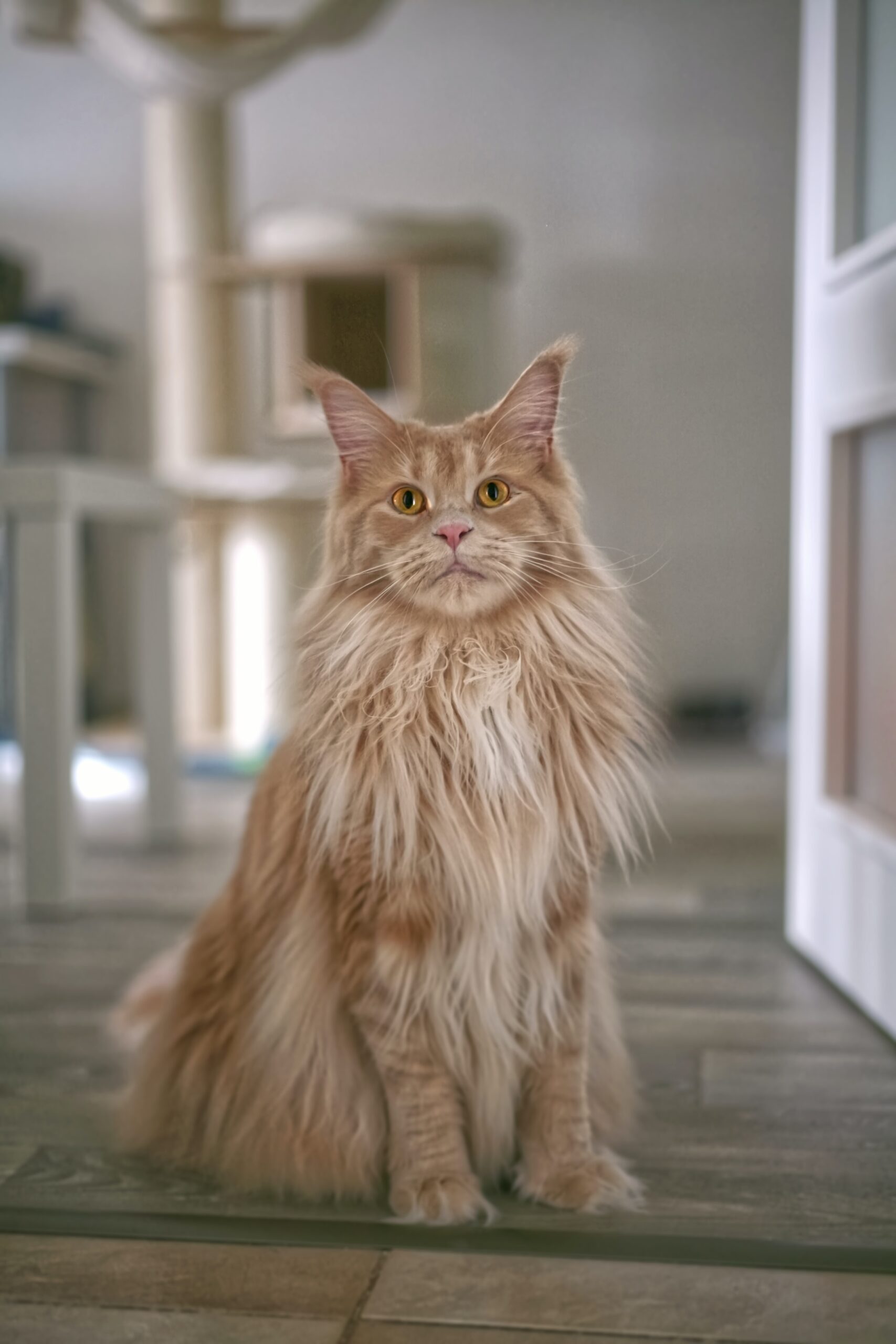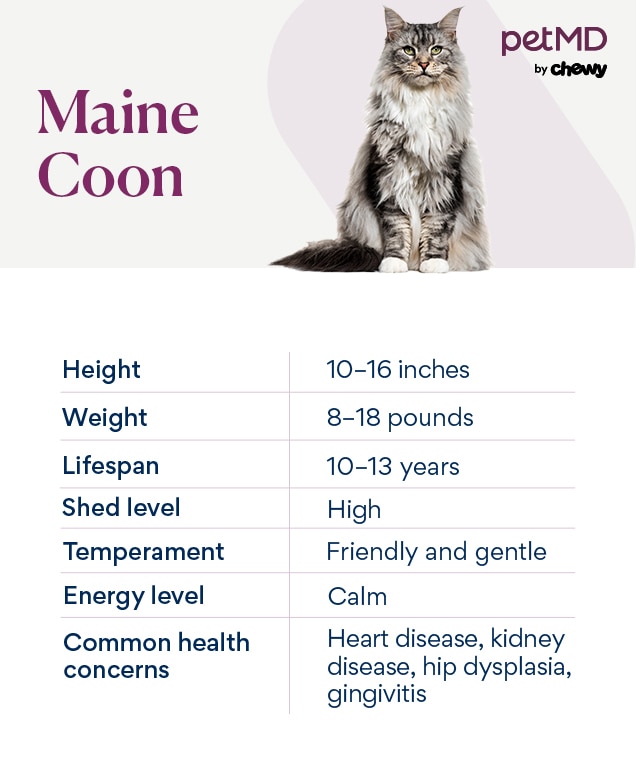Are you the proud owner of a Maine Coon cat, or are you considering bringing one into your home? These majestic creatures, known for their friendly nature and stunning appearance, can bring endless joy to your life.
But, have you ever wondered what it takes to keep them happy and healthy? You’re in the right place. In this guide, you’ll discover simple yet effective ways to ensure your Maine Coon receives the best care possible. By the end, you’ll feel confident in providing a loving and nurturing environment for your feline friend.
Ready to uncover the secrets to a harmonious life with your Maine Coon? Let’s dive in!

Credit: www.petcarerx.com
Maine Coon Characteristics
Maine Coons need regular grooming to keep their thick fur healthy. Provide them with plenty of space to roam. A balanced diet and routine vet check-ups ensure their well-being. Keep them entertained with toys and engage in playtime to maintain their active lifestyle.
Maine Coon cats are truly magnificent creatures with distinct characteristics that set them apart from other breeds. Known for their impressive size and charming personality, these gentle giants are a delightful addition to any home. Understanding the unique traits of a Maine Coon can help you provide the best care and environment for your feline friend.Physical Traits
Maine Coons are one of the largest domesticated cat breeds. Adult males can weigh between 13 to 18 pounds, while females typically weigh between 8 to 12 pounds. Their size can be intimidating, but their fluffy coats and bushy tails make them incredibly endearing. Their fur is dense and water-repellent, which means they require regular grooming to prevent matting. A weekly brushing session can become a bonding time for you and your Maine Coon. Don’t be surprised if your cat enjoys the grooming process—they often do! Their tufted ears and large, expressive eyes give them a wild look that many cat lovers find irresistible. You might notice how their eyes seem to follow you around the room, watching your every move with curiosity and affection.Personality And Temperament
Maine Coons are known for their friendly and sociable nature. They often get along well with children and other pets, making them a perfect family pet. If you have guests over, be prepared for your Maine Coon to steal the spotlight with its sociable antics. They possess a dog-like loyalty and may even follow you from room to room. If you’ve ever had a Maine Coon, you know the joy of having a furry shadow. Their gentle demeanor means they’re less likely to show aggression, but they can be quite vocal, especially when seeking attention or food. Maine Coons are intelligent and playful. They enjoy interactive toys and puzzles that challenge their minds. Consider setting up a play area where they can climb and explore. Have you ever noticed how a Maine Coon can make even a cardboard box seem like the most exciting place on earth? Understanding your Maine Coon’s characteristics allows you to connect with them on a deeper level. What unique trait does your Maine Coon have that brings a smile to your face every day?Choosing The Right Environment
Maine Coons are majestic creatures with a personality that matches their striking appearance. Choosing the right environment for your Maine Coon is crucial to ensure they thrive both physically and emotionally. Consider how your living space can accommodate their unique needs, and think about the safety measures that can protect your furry friend.
Space Requirements
Maine Coons are known for their large size and active nature. They need ample space to roam and explore. If you live in a small apartment, think about vertical space; cat trees and shelves can provide climbing opportunities.
In my experience, creating a cozy corner with a soft bed and toys can help them feel secure. They love lounging in sunny spots, so place their bed near a window. Does your living space encourage their natural instincts?
Safety Measures
Safety is a top priority when housing a Maine Coon. They are curious creatures, prone to investigating every nook and cranny. Ensure windows have secure screens to prevent accidental falls.
Small items like rubber bands or hair ties can be a choking hazard. Keep these out of reach. Consider using childproof locks on cabinets if your cat is particularly inquisitive. What changes can you make to enhance safety in your home?
Remember, creating a safe and stimulating environment not only keeps your Maine Coon healthy but also nurtures their curious and playful spirit. Adapting your space to meet their needs can lead to a happier and more content pet. Are you ready to transform your home into a Maine Coon haven?
Diet And Nutrition
Understanding the diet and nutrition of a Maine Coon is vital for their health. These cats have specific dietary needs due to their size and energy levels. Feeding them the right foods ensures they thrive and stay active.
Feeding Schedule
Maine Coons benefit from a consistent feeding schedule. Regular meal times help maintain their metabolism and energy. Feed them twice a day. Offer meals in the morning and evening. This routine keeps their energy steady throughout the day.
Recommended Foods
High-quality protein is crucial for Maine Coons. Include chicken, turkey, and fish in their diet. These proteins support muscle growth and energy. Choose dry kibble formulated for large breeds. These contain essential nutrients for their size.
Wet food can be given occasionally. It provides hydration and variety. Look for brands with no artificial additives. Natural ingredients are better for their health. Always check labels for balanced nutrition.

Credit: www.pbspettravel.co.uk
Grooming Essentials
Maine Coons need regular grooming to keep their thick fur healthy. Brush their coat to prevent tangles and mats. Clean their ears and trim nails often to maintain cleanliness and comfort.
Maine Coons are renowned for their majestic appearance and gentle temperament, making them a beloved breed among cat enthusiasts. However, their impressive size and luxurious coat require dedicated grooming to keep them looking their best. Understanding the essentials of grooming can make this task enjoyable and rewarding for both you and your furry friend. Dive into the details and discover how to keep your Maine Coon in tip-top shape.Coat Maintenance
The Maine Coon’s coat is both a blessing and a challenge. Their long, dense fur needs regular attention to prevent tangles and mats. Aim to brush your cat at least twice a week. Choose a sturdy brush designed for long-haired cats. A wide-toothed comb can help with stubborn knots. Have you noticed your cat shedding more during certain seasons? Increase your grooming sessions during these times to manage the extra fur.Nail And Ear Care
Regular nail trimming is crucial for your Maine Coon’s comfort and health. Long nails can cause discomfort and damage furniture. Use cat-specific nail clippers, and aim to trim their nails every few weeks. If you’re unsure about the process, ask your vet for guidance. Don’t forget about ear care. Maine Coons are prone to ear issues due to their ear shape. Check their ears weekly for dirt and wax. Gently clean with a damp cotton ball, avoiding deep insertion. If you notice any unusual odor or discharge, consult your veterinarian. By focusing on these grooming essentials, you’re not just maintaining your cat’s appearance but also promoting their overall health. How does your Maine Coon respond to grooming? Share your experiences in the comments!Health And Wellness
Maine Coon cats are known for their majestic appearance and friendly nature. Caring for their health and wellness is essential to keep them happy and energetic. This involves regular vet visits, understanding common health issues, and maintaining a healthy lifestyle.
Routine Check-ups
Regular vet visits are crucial for Maine Coons. These check-ups help detect early signs of illness. A vet examines their eyes, ears, and teeth. They also check their weight and general condition. Routine vaccinations protect against diseases. Schedule annual visits to ensure your cat stays healthy.
Common Health Issues
Maine Coons face specific health challenges. Hip dysplasia is one common issue. It affects their movement and comfort. Regular exercise helps manage this condition. Heart disease is another concern. Watch for symptoms like fatigue or coughing. Genetic tests can detect heart problems early. Kidney disease may develop in older cats. Provide fresh water and monitor their diet. Recognize signs like weight loss or increased thirst. Quick action can prevent complications.
Exercise And Activity
Maine Coons are known for their playful nature and need for exercise. Their large size requires regular activity to maintain health and happiness. Without sufficient movement, they can become overweight and bored. It’s crucial to engage them in fun and stimulating activities.
Interactive Play
Interactive play sessions are vital for Maine Coons. Toys that mimic prey can excite their hunting instincts. Feather wands and laser pointers are popular choices. These toys encourage jumping and chasing, providing good exercise. It helps them burn energy and stay fit.
Mental Stimulation
Mental stimulation is equally important for these intelligent cats. Puzzle toys challenge their minds and keep them occupied. Hide treats in puzzle feeders to make them work for food. This keeps them engaged and prevents boredom. Regular mental challenges lead to a happier cat.
Socialization Needs
Maine Coons are friendly and sociable cats. They thrive on interaction and companionship. Understanding their socialization needs is crucial for a happy cat. A well-socialized Maine Coon is more adaptable and less stressed.
These cats love being part of the family. They enjoy the presence of humans and other pets. Socialization plays a key role in their overall well-being.
Bonding With Family
Bonding with family is essential for Maine Coons. They seek affection and attention from their human companions. Spend quality time with your cat daily. This strengthens your bond and builds trust.
Engage your cat in play sessions. Use toys to stimulate their minds. Maine Coons enjoy interactive games. These activities enhance their happiness and health.
Talk to your cat regularly. Your voice comforts them. They love listening to you. This interaction is vital for their social needs.
Interaction With Other Pets
Maine Coons are known for their gentle nature. They usually get along well with other pets. Introduce them to other animals slowly. This helps them adapt better.
Supervise initial meetings between pets. This ensures safety for all involved. Gradually increase their interaction time. Observe their behavior closely.
Encourage positive interactions among pets. Reward them with treats. Praise them for friendly behavior. This fosters a peaceful environment at home.
Provide separate spaces for each pet. This gives them room to relax alone. Respect their individual needs. Happy pets lead to a harmonious household.

Credit: www.petmd.com
Training Tips
Maine Coons are known for their intelligence and friendly nature. Training them can be a rewarding experience. With patience and consistency, you can teach them various skills. Training your Maine Coon strengthens your bond and enriches their life. Let’s explore some essential training tips.
Litter Box Training
Litter box training is crucial for every indoor cat. Start by placing the box in a quiet corner. Make sure it’s easily accessible. Show your Maine Coon the box after meals and naps. If they use it, reward them with praise or a treat. Clean the box regularly to maintain hygiene. This encourages them to return to a fresh space. Avoid harsh punishments if they miss the box. Instead, gently guide them back and reinforce positive behavior.
Basic Commands
Teaching basic commands like “sit” or “come” can be fun. Use treats as motivation. Start with short sessions to hold their attention. Say the command clearly and use a hand signal. When they follow, reward them immediately. Consistency is key to helping them learn. Practice daily to reinforce the commands. Keep sessions positive and engaging. This builds trust and makes learning enjoyable.
Frequently Asked Questions
How Often Should I Groom My Maine Coon?
Maine Coons need grooming at least once a week. Their long fur can easily mat and tangle, requiring regular brushing. Use a metal comb to gently detangle knots. Regular grooming helps keep their coat healthy and reduces shedding around your home.
What Diet Is Best For Maine Coons?
Maine Coons thrive on a balanced diet of high-protein food. Choose quality dry kibble or wet food with real meat. Ensure it includes essential nutrients like taurine. Avoid fillers and artificial additives. Always provide fresh water to keep them hydrated.
Do Maine Coons Need Special Exercise?
Maine Coons are active cats that benefit from regular play. Engage them with interactive toys like feather wands. Provide scratching posts and climbing structures. Daily playtime helps maintain their physical health and prevents boredom.
How Can I Keep My Maine Coon Healthy?
Regular vet check-ups are crucial for Maine Coon health. Monitor their weight and dental hygiene. Ensure vaccinations and parasite prevention are up-to-date. Provide a balanced diet and plenty of exercise. Keep their environment clean and stress-free.
Conclusion
Taking care of a Maine Coon requires love and patience. These cats are friendly and enjoy company. Regular grooming keeps their fur healthy. Their diet should be balanced for strong growth. Playtime is important for their active nature. Ensure they have space to roam and explore.
Routine vet check-ups keep them in good health. A clean and safe environment is vital. Understand their unique needs and behaviors. With proper care, a Maine Coon will be a happy companion. Embrace their gentle personality and enjoy their company.
They bring joy and warmth to any home.
{ “@context”: “https://schema.org”, “@type”: “FAQPage”, “mainEntity”: [ { “@type”: “Question”, “name”: “How often should I groom my Maine Coon?”, “acceptedAnswer”: { “@type”: “Answer”, “text”: “Maine Coons need grooming at least once a week. Their long fur can easily mat and tangle, requiring regular brushing. Use a metal comb to gently detangle knots. Regular grooming helps keep their coat healthy and reduces shedding around your home.” } } , { “@type”: “Question”, “name”: “What diet is best for Maine Coons?”, “acceptedAnswer”: { “@type”: “Answer”, “text”: “Maine Coons thrive on a balanced diet of high-protein food. Choose quality dry kibble or wet food with real meat. Ensure it includes essential nutrients like taurine. Avoid fillers and artificial additives. Always provide fresh water to keep them hydrated.” } } , { “@type”: “Question”, “name”: “Do Maine Coons need special exercise?”, “acceptedAnswer”: { “@type”: “Answer”, “text”: “Maine Coons are active cats that benefit from regular play. Engage them with interactive toys like feather wands. Provide scratching posts and climbing structures. Daily playtime helps maintain their physical health and prevents boredom.” } } , { “@type”: “Question”, “name”: “How can I keep my Maine Coon healthy?”, “acceptedAnswer”: { “@type”: “Answer”, “text”: “Regular vet check-ups are crucial for Maine Coon health. Monitor their weight and dental hygiene. Ensure vaccinations and parasite prevention are up-to-date. Provide a balanced diet and plenty of exercise. Keep their environment clean and stress-free.” } } ] }